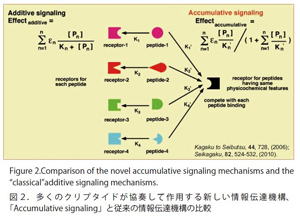Research theme:
1.Identification of various cryptides, functional cryptic peptides hidden in protein structures
2.Investigation of the novel "accumulating signaling" mechanism to develop therapeutic drugs and functional foods
The physiological roles of fragmented peptides that are simultaneously produced during maturation and degradation of peptidergic hormones, neurotransmitters, and modulators as well as functional proteins have recently been of particular interest. Namely, biologically active peptides are matured by specific proteolytic cleavages of their precursor proteins which have no biological functions, and then degraded by various proteases. During these processes, many fragmented peptides are also produced from the same precursor proteins. Although the physiological importance of these fragmented peptides has not been well elucidated yet, they may have various unexpected biological functions.

Recently, we purified and identified novel neutrophil-activating peptides mitocryptide-1, mitocryptide-2, and mitocryptide-CYC that were cleaved from mitochondrial cytochrome c oxidase, cytochrome b, and cytochrome c respectively(3, 4; Biopolymers, 2007, 88, 190). We also found many neutrophil-activating peptides derived from various mitochondrial proteins. Moreover, peptides produced from not only mitochondrial but also other proteins such as hemoglobin were shown to regulate a variety of biological functions including various hormone releases and cell proliferation. These lines of evidence proposed that such fragmented peptides play critical roles including triggering infl ammatory responses and healing damaged tissues. We therefore named these functional "cryptic" peptides that are hidden in protein structures as "cryptides".

We are now attempting to find novel cryptides systematically, and identifying
receptors and signaling molecules that involve the novel "accumulative
signaling" mechanism. These investigations are expected to make
possible to develop new types of therapeutic drugs and functional foods
|
|
![]()
![]()